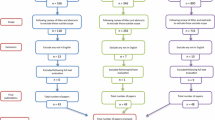Abstract
Objectives The present study aims to investigate (1) what is the influence of illness labels (flu, asthma and angina pectoris) upon the level of agreement with the prescription of generic medicines, and (2) the influence of socio-demographic factors on lay beliefs about generic medicines, in general, and for different illness labels. Method This was a cross-sectional design in which the participants were Portuguese, men and women, aged over 18 years old, and recruited from the general population (non-patients). The participants completed an anonymous self-administered questionnaire which included measures of lay beliefs about generic medicines in general (GMS), level of agreement with the prescription of a generic medicines for different illnesses, and socio-demographic factors. Main outcome measure Level of agreement with the use of generic medicines for flu, asthma and angina pectoris. Results Participants seemed to have well-defined beliefs about generics concerning their efficacy and similarity with brand medicines. Beliefs about the efficacy of generic medicines were significantly different according to the three age groups (18–25 years, mean = 3.84 (0.56); 26–37 years, mean = 3.80 (0.61); >38 years, mean = 3.72 (0.66); F = 4.4; P = 0.01), and level of education attained (9 years, mean = 3.60 (0.69); 12 years, mean = 3.78 (0.57); graduate, mean = 3.93 (0.54); F = 32.2; P = 0.000). Although participants have a moderate level of agreement with the prescription of generic medicines for the three different illnesses, their agreement significantly decreased when the illness was perceived as more serious. The lay beliefs about generics seemed to moderate the level of agreement with the prescription of a generic medicine. Conclusions Lay beliefs about generic medicines may influence the level of agreement with the prescription of a generic medicine in a general population sample. These results raise important questions concerning the need to consider illness perceptions of lay people and their relationship with perceptions of treatment for different conditions.

Similar content being viewed by others
References
Ganther JM, Kreling DH. Consumer perceptions of risk and required cost savings for generic prescription drugs. J Am Pharm Assoc. 2000;40(3):378–83.
Haas JS, Phillips KA, Gerstenberger E, Seger AC. Potential savings from substituting generic drugs for brand-nane drugs: medical expenditure panel survey, 1997–2000. Ann Intern Med. 2005;142:891–7.
Himmel W, Simmenroth-Nayda A, Niebling W, Ledig T, Jansen RD, Kochen MM, et al. What do primary care patients think about generic drugs? Int J Clin Pharmacol Ther. 2005;43(10):472–9.
Plano Integrado Genéricos. Infarmed—Instituto Nacional da Farmácia e do Medicamento. 2007. Available via http://www.infarmed.pt. Accessed September 2007.
Gaither CA, Kirking DM, Ascione FJ, Welage LS. Consumers’ views on generic medications. J Am Pharm Assoc. 2001;41(5):729–36.
Horne R. Patients’ beliefs about treatment: the hidden determinant of treatment outcome? J Psychosom Res. 1999;47(6):491–5.
Leventhal H, Benyamini Y, Brownlee S, Diefenbach M, Leventhal EA, Patrick-Miller L, Robitaille C. Illness representations: theoretical foundations. In: Petrie KJ, Weinman JA, editors. Perceptions of Health & Illness. Netherlands: Harwood Academic Publishers; 1997. p. 19–45 (ISBN 90-5702-103-X).
Britten N. Patients’ ideas about medicines: a qualitative study in a general practice population. Br J Gen Pract. 1994;44:465–8.
Conrad P. The meaning of medications: another look at compliance. Soc Sci Med. 1985;20:29–37.
Morgan M, Watkins CJ. Managing hypertension: beliefs and responses to medication among cultural groups. Sociol Health Illn. 1988;10:561–78.
Rao D. Choice of medicine and hierarchy of resort to different health alternatives among Asian Indian migrants in a metropolitan city in the USA. Ethn Health. 2006;11(2):153–67.
Figueiras MJ, Marcelino D, Cortes MA, Horne R, Weinman J.: Crenças de Senso-comum sobre medicamentos genéricos vs. medicamentos de marca: um estudo piloto sobre diferenças de género. Análise Psicológica. 2007;3(XXV):427–37.
Figueiras MJ, Marcelino D, Cortes MA. Medicamentos genéricos: crenças de senso-comum da população portuguesa. Rev Port Clin Geral. 2007;23:43–51.
Yelkur R, Capella LM. Generic prescription drugs: awareness, attitudes and intentions of elderly consumers. In: Engelland BT, Smart DT, editors. Marketing: foundations for a changing world. Orlando, FL: Southern Marketing Association; 1995. p. 57–60.
Kjonniksen I, Lindbaek M, Granas AG. Patients’ attitudes towards and experiences of generic drug substitution in Norway. Pharm World Sci. 2006;28(5):284–9.
Baron RM, Kenny DA. The moderator-mediator variable distinction in social psychological research: conceptual, strategic and statistical considerations. J Pers Soc Psychol. 1986;51(6):1173–82.
Acknowledgments
We would like to thank Professor J. Weinman for the suggestions made in the preparation of this manuscript.
Financial support for the study
Fundação para a Ciência e a Tecnologia, Programa Operacional Ciência e Inovação 2010 (POCI 2010) and Fundo Comunitário Europeu FEDER - Ref.: POCI/PSI/60745/2004.
Possible conflict of interest
None.
Author information
Authors and Affiliations
Corresponding author
Rights and permissions
About this article
Cite this article
Figueiras, M.J., Marcelino, D. & Cortes, M.A. People’s views on the level of agreement of generic medicines for different illnesses. Pharm World Sci 30, 590–594 (2008). https://doi.org/10.1007/s11096-008-9247-y
Received:
Accepted:
Published:
Issue Date:
DOI: https://doi.org/10.1007/s11096-008-9247-y




